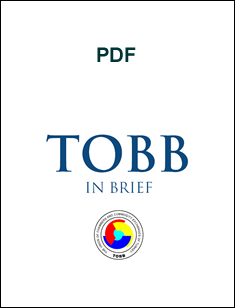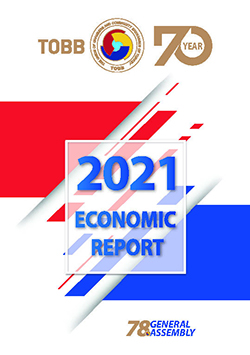Purpose and Organs
TOBB performs the following functions:
» To lead and guide the Turkish entrepreneurs.
» To submit opinions and comments to the political power in line with the requirements of the private sector.
» To strive for expanding the idea and ideals of private sector.
» To ensure that the small and medium size enterprises (SMEs) which constitute the backbone of the economy, receive is equitable share.
» To submit opinions to cornerned ministries and parliamentary commissions regarding laws and regulations in draft form or in force.
» To undertake the distribution of around 470.000 TIR carnets to 976 haulers annually with a risk in excess of 15 billion Dollars and the issue of about 460.000 transit permits.
» To prepare around 1000 ATA carnets per annum for the export of goods valued at around 10 million Dollars under warranty to Turkish and foreign customs administrations for temporary admittance formalities.
» To conduct the EANUCC system as a service to over 12.000 members.
» To prepare more than 10.000 capacity reports per annum upon request of concerned corporate entities.
» To publish a Trade Registration Gazette of 650 pages daily in which more than 2.000 announcements are printed.
» To establish the electronic infrastructure in order to standardize the services rendered by chambers and commodity exchanges, to assure using common methods for bookkeeping, and to collect data related to our members,
» To solve professional conflicts that may arise among chambers and commodity exchanges.
» To offer its members necessary information that may be useful in their commercial, economic and international activities by following developments in science and technology. The product prices set at the commodity exchanges are made available to its members and to the rest of the world via such international agencies such as the Reuters and its own Internet system.
» To offer information and consultancy services through chambers and commodity exchanges for helping the SMEs to solve their operational problems, to investigate the problems restricting their success at international markets, and to thereby contribute to the identification of a national SME policy.
» To conduct the TOBB arbitration system.
» To carry out functions under the legislation in force for the development of apprenticeship, vocational and technical training within the scope of raising a qualified labour force.
» To establish or to participate in the educational institutions and to cooperate with these institutions.
» To establish organized industrial regions and technology development centers.
» To participate in the formulation of vocational standards, test and certification procedures.
» To conduct in-service training programs for improving the service quality of its own personnel.
» To authorize competent companies to organize domestic fairs.
» To participate in the Economic and Social Council.
» To strive for the elimination of interregional differences at the development level and the restructure of social equilibrium in conformance with the current requirements.
» To cast light on the future by its work and scientific researches.
» To prepare reports on country, province and sector basis.
» To establish and maintain the Sectoral Assemblies for comprehensive and accurate identification of sectoral problems, transmission of findings to the Government and their timely finalization.
» To constitute, for performing detailed studies on economic and social issues as a requirement of its consultative functions, ad hoc specialization committees made up of experienced academicians and upper-level bureaucrats of concerned public and private agencies.
Organs
» General Assembly
» Councils of Chambers and Commodity Exchanges
» Executive Board
» High Discipline Board
All organs of TOBB are elected through a democratic process. "General Assembly", the supreme body of the organization, consist of 1000-1300 members elected for a four-year-term by the members of the assemblies of local chambers and commodity exchanges.
In turn, the General Assembly, through election, forms five "Councils" representing chambers of commerce, industry, commerce and industry, maritime commerce and commodity exchanges. The president and fourteen member "Board of Directors" are elected by the General Assembly by its members.
The Board then elects five Vice-Presidents, each representing chambers and commodity exchanges for a four-year term.
Your message has been sent
Thank you |




